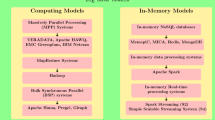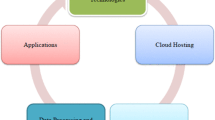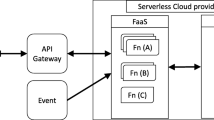Abstract
Smart devices such as mobile phones and smart TVs are widely used for enriching our daily activities. Although their power source and processing speed are limited, it is necessary for these devices to provide certain computation power. To enhance computation capability on smart devices, offloading is proposed as one of the effective approaches. However, it requires extra efforts for developers to implement the offloading mechanism for each application. HTML5 standard provides a feature called Web Worker which allows web pages to spawn separate threads as workers. Since each worker holds individual execution environments and contexts, it is appropriate for offloading without complex partition. In this paper, we present a generic offloading framework for JavaScript Web Worker named Web Worker Offloading Framework (WWOF). This framework can offload the workers from browsers to the cloud easily and seamlessly. The Web Worker runs on an offloading server instead of on the browser, and exchanges data with clients via WebSocket. To prove the feasibility of this framework, we evaluated several benchmarks on different platforms including PCs, tablets, mobile phones and smart TVs. It is verified that this framework is able to suppress the devices’ power consumption and to increase the execution speed, while running a heavy workload.
















Similar content being viewed by others
Notes
Gong X, Liu W, Zhang J, et al. WWOF: An Energy Efficient Offloading Framework for Mobile Webpage[C]//Proceedings of the 13th International Conference on Mobile and Ubiquitous Systems: Computing, Networking and Services. ACM, 2016: 160–169.
References
Chun BG, Ihm S, Maniatis P, Naik M, Patti A (2011) Clonecloud: Elastic execution between mobile device and cloud. In: Proceedings of the Sixth Conference on Computer Systems, EuroSys ’11. https://doi.org/10.1145/1966445.1966473. ACM, New York, pp 301–314
Cuervo E, Balasubramanian A, Cho D-k, Wolman A, Saroiu S, Chandra R, Bahl P (2010) Maui: making smartphones last longer with code offload. In: Proceedings of the 8th International Conference on Mobile Systems, Applications, and Services, MobiSys ’10. https://doi.org/10.1145/1814433.1814441. ACM, New York, pp 49–62
Gong X, Liu W, Zhang J, Xu H, Zhao W, Liu C (2016) Wwof: an energy efficient offloading framework for mobile webpage. In: Proceedings of the 13th International Conference on Mobile and Ubiquitous Systems: Computing, Networking and Services, MOBIQUITOUS 2016. https://doi.org/10.1145/2994374.2994379. ACM, New York, pp 160–169
Hwang I, Ham J (2014) Cloud offloading method for web applications. In: 2014 2nd IEEE International Conference on Mobile Cloud Computing, Services, and Engineering (MobileCloud). IEEE, pp 246–247
Kemp R, Palmer N, Kielmann T, Bal HE (2010) Cuckoo: a computation offloading framework for smartphones. In: MobiCASE. Springer, pp 59–79
Kumar K, Liu J, Lu YH, Bhargava B (2013) A survey of computation offloading for mobile systems. Mob Netw Appl 18(1):129–140
Kwon Y, Yi H, Kwon D, Yang S, Cho Y, Paek Y (2016) Precise execution offloading for applications with dynamic behavior in mobile cloud computing. Pervasive Mob Comput 27:58–74
Li WYS, Wu S, Chan WK, Tse TH (2012) Jscloud: Toward remote execution of javascript code on handheld devices. In: 2012 12th International Conference on Quality Software. https://doi.org/10.1109/QSIC.2012.14, pp 240–245
Maeda K (2012) Performance evaluation of object serialization libraries in xml, json and binary formats. In: 2012 Second International Conference on Digital Information and Communication Technology and it’s Applications (DICTAP). https://doi.org/10.1109/DICTAP.2012.6215346, pp 177–182
Odroid: Smart Power. http://odroid.com/dokuwiki/doku.php?id=en:odroidsmartpower
Park S, Chen Q, Yeom HY (2013) Pios: a platform-independent offloading system for a mobile web environment. In: 2013 IEEE 10th Consumer Communications and Networking Conference (CCNC). https://doi.org/10.1109/CCNC.2013.6488437, pp 137–142
Pilgrim M (2010) HTML5: up and running: dive into the future of web development. O’Reilly Media Inc.
RFC: The WebSocket Protocol. https://tools.ietf.org/html/rfc6455
websocket: WS. https://github.com/websockets/ws/
Xu C, Qiao Y, Lee B, Murray N (2014) Moja - mobile offloading for javascript applications. In: Irish Signals Systems Conference 2014 and 2014 China-Ireland International Conference on Information and Communications Technologies (ISSC 2014/CIICT 2014). 25th IET. https://doi.org/10.1049/cp.2014.0659, pp 59–63
Xu C, Qiao Y, Lee B, Murray N (2015) Energy consumption of mobile offloading for javascript applications. In: Signals and Systems Conference (ISSC), 2015 26th Irish. https://doi.org/10.1109/ISSC.2015.7163769, pp 1–6
Yang S (2012) Manageable granularity in mobile application code offloading for energy savings. In: 2012 IEEE International Conference on Green Computing and Communications (GreenCom). https://doi.org/10.1109/GreenCom.2012.93, pp 611–614
Yu M, Huang G, Wang X, Zhang Y, Chen X (2015) Javascript offloading for web applications in mobile-cloud computing. In: 2015 IEEE International Conference on Mobile Services. https://doi.org/10.1109/MobServ.2015.46, pp 269–276
Yujian Y Html5 gomoku. https://github.com/yyjhao/HTML5-Gomoku
Zbierski M, Makosiej P (2014) Bring the cloud to your mobile: transparent offloading of html5 web workers. In: 2014 IEEE 6th International Conference on Cloud Computing Technology and Science (CloudCom). IEEE, pp 198–203
Acknowledgements
This work is supported by the Specialized Research Fund for the Doctoral Program of Higher Education of China (20130031120028), the Research Plan in Application Foundation and Advanced Technologies in Tianjin (14JCQNJC 00700), the Open Project of the State Key Laboratory of Computer Architecture, Institute of Computing Technology, Chinese Academy of Sciences (CARCH201604), and the Natural Science Foundation of Tianjin (16JCY- BJC15 200)
Author information
Authors and Affiliations
Corresponding author
Rights and permissions
About this article
Cite this article
Zhang, J., Liu, W., Zhao, W. et al. A Webpage Offloading Framework for Smart Devices. Mobile Netw Appl 23, 1350–1363 (2018). https://doi.org/10.1007/s11036-018-1009-z
Published:
Issue Date:
DOI: https://doi.org/10.1007/s11036-018-1009-z




